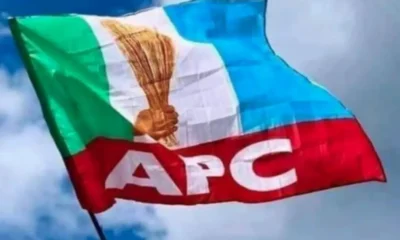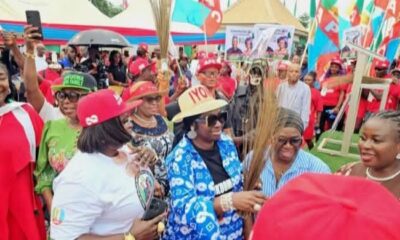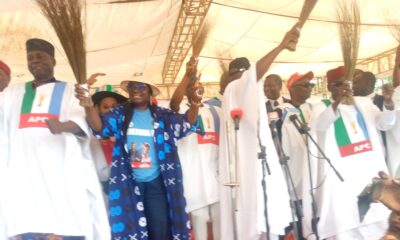That the Independent National Electoral Commission (INEC) has fixed the Anambra State gubernatorial election for Saturday, November 8, 2025 is no longer news for ndi Anambra. Attention has turned to the All Progressives Congress (APC) and its flagbearer, Prince Nicholas Ukachukwu, who will run alongside Senator Uche Lilian Ekwunife as deputy. The APC, often described as “not at home” in Anambra and much of the South-East, faces an uphill battle. Yet, the choice of running mate has introduced new dynamics into the conversation about the party’s chances.
The Ekwunife Factor
Senator Uche Ekwunife is no stranger to Anambra politics. A grassroots mobiliser with nearly two decades of parliamentary experience, she has served as a two-term member of the House of Representatives (2007–2015) and represented Anambra Central in the Senate (2019–2023). At the Senate, she chaired key committees, including Science and Technology, and earlier Downstream Petroleum, becoming the first person from the South East to chair the committee and first female as well and consistently ranking high in legislative productivity.
In April 2023, tracking reports placed the daring Senator third among all senators with 30 bills and 17 motions in the Ninth Assembly. This performance is not just a number—it reflects her ability to master legislative processes, draft policy frameworks, and engage with ministries and agencies to see laws through. These are the kinds of skills that resonate in governance and project delivery, especially in a state that often clamours for federal presence.
Her current role as Director-General of the South-East Governors’ Forum has also broadened her profile. Here, she coordinates inter-state development priorities and negotiations, a role that requires both tact and influence. Whether or not voters agree with her politics, very few doubt her capacity to navigate Abuja’s corridors of power—an advantage any governor would want in a deputy.
APC’s Position in Anambra
For decades, Anambra has leaned towards parties like the All Progressives Grand Alliance (APGA), while Labour Party’s 2023 surge further redefined the state’s political landscape. The APC’s structures in Anambra are comparatively weak, and past elections have seen the party struggle to make inroads at ward level.
Still, the Ukachukwu–Ekwunife ticket has sought to reframe the contest. Ukachukwu has repeatedly told supporters that the mission is to “align Anambra with the government at the centre.”
After receiving the party flag at the Presidential Villa in May, he declared the APC would “deliver Anambra to the APC,” signalling his closeness to Abuja’s power networks.
Observers point out that elite endorsements could matter. In July, for instance, the influential Nri community in Anaocha LGA not taking away the fact that Senator Ekwunife hails from the community, publicly endorsed the ticket, an early sign of localised support. If more such communities follow suit, the APC could slowly chip away at the dominance of traditional parties.
The Integrity Question
No discussion of Anambra’s electoral landscape is complete without addressing credibility. The August 2025 bye-elections in Anambra South Senatorial District and Onitsha North I Constituency exposed troubling trends. Reports from BusinessDay, Vanguard, and other news outlets highlighted massive vote-buying, late arrival of materials, and low turnout. Though INEC had warned beforehand against inducements, but allegations persisted as parties traded accusations of rigging and manipulation.
These experiences have left many voters skeptical, setting the stage for November. For the APC—or any party—to gain legitimacy, distancing itself from malpractice will be crucial. Nigerians have not forgotten the optics of the August bye-polls, and Anambra’s politically active civil society will be watching closely.
What the APC Must Get Right
While no single factor guarantees victory, certain elements can improve any party’s competitiveness in a state like Anambra:
A Credible Messenger
The ticket’s biggest asset is Senator Ekwunife. Her record of bills, motions, and visible constituency projects provide evidence of delivery. If the campaign leans on her competence narrative, it can reassure undecided voters that APC is not fielding a weak team.
Issue Clarity
Prince Ukachukwu has already promised industrial parks and youth empowerment schemes during town halls in Onitsha. But voters are increasingly asking for costed, time-bound plans. Clear roadmaps on jobs, roads, and security will determine how seriously the ticket is taken.
Coalition Building
Unity within the APC family is essential. Past Anambra elections have been marred by intra-party sabotage. Reports suggest the party leadership is already working to “unite for Ukachukwu/Ekwunife.” That must be sustained until election day.
Professional Poll Management
Off-cycle elections are won or lost on logistics. Properly trained party agents, this cannot be overemphasised, lawful engagement with security, and real-time monitoring of INEC’s result portals (IReV) will be vital in ensuring votes are counted as cast.
Curbing Vote-Buying and Rigging
Perhaps the greatest challenge is quelling malpractice.
The August bye-elections were a warning shot. Here are systemic steps, for APC and other parties seeking to wrestle power from the incumbent to restore credibility:
Strict BVAS use: Ensuring backup devices and seamless voter authentication leaves little room for ghost voting.
No-cash polling perimeters:
Security agencies must enforce INEC’s prohibition on inducements around polling units.
Hotline & reporting dashboards:
Civil society and INEC should expand incident reporting channels for transparency.
Unit-level result uploads: Rapid publication of polling-unit results builds confidence and prevents tampering at collation centres.
Voter education: Continuous campaigns to remind voters of the illegality and dangers of selling votes can reduce susceptibility to inducement.
The APC’s road in Anambra is steep, but not impossible. The party is betting that Senator Uche Ekwunife’s credibility, experience, and wide name recognition can soften traditional resistance to the APC brand in the South-East.
Whether that calculation proves right depends on the party’s ability to articulate clear policies, maintain internal unity, and—most importantly—play by the rules in a state that has little patience for electoral malpractice.
November 8, 2025, will therefore not only test the APC’s electoral machinery, it will also test the APGA-led government in Anambra’s resolve to play by the rules and not use state powers to determine outcome of the election and also Anambra’s faith in democratic integrity.
Ejike Agbata writes from Nri, Anaocha LGA, Anambra

 NEWS2 years ago
NEWS2 years ago
 MUSIC4 years ago
MUSIC4 years ago
 MUSIC4 years ago
MUSIC4 years ago
 MUSIC2 years ago
MUSIC2 years ago






















